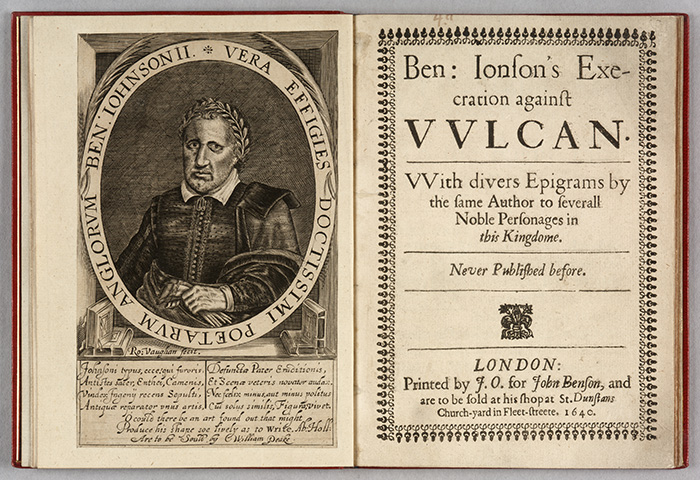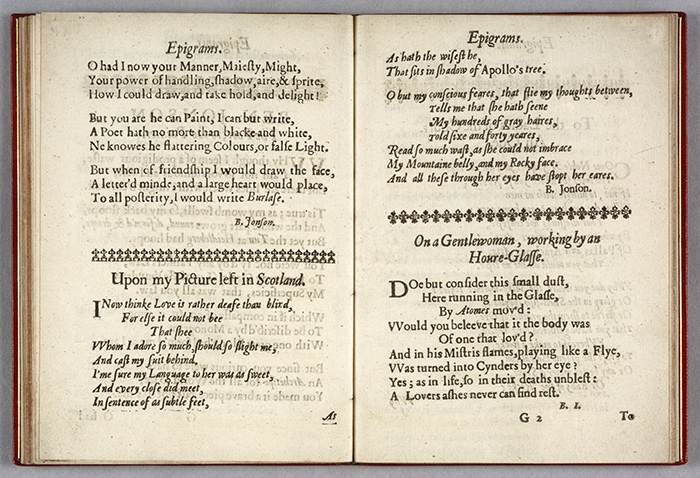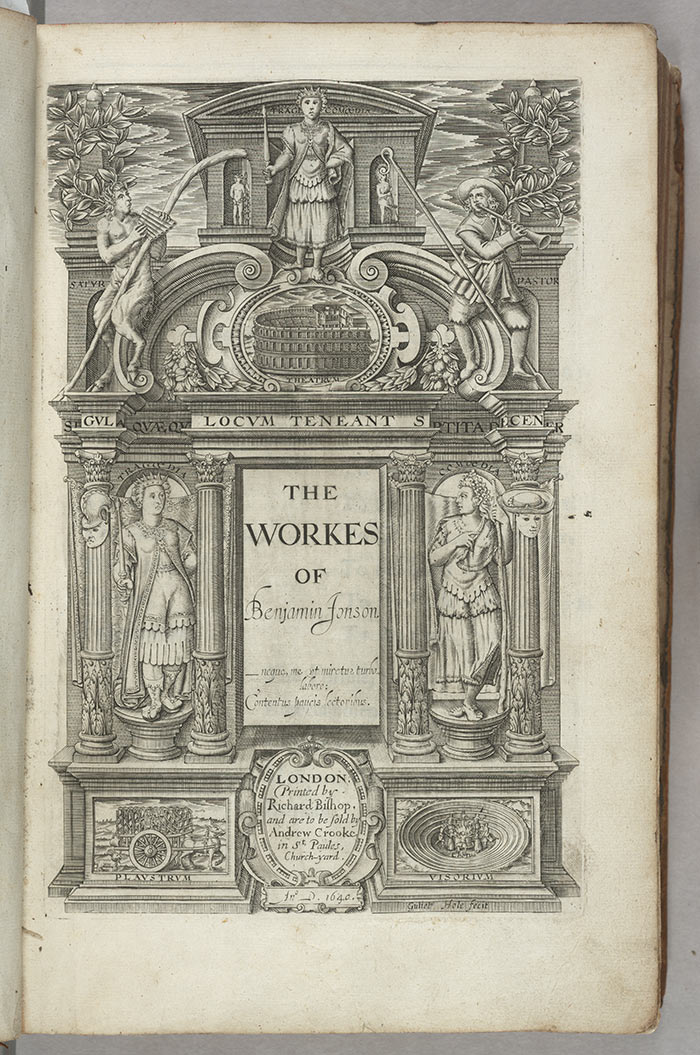Posted on Mon., Sept. 12, 2016 by and
The conference “Ben Jonson: 1616-2016” takes place at The Huntington on Sept. 16 and 17 in Rothenberg Hall. We asked the conference’s conveners—Martin Butler, professor of English Renaissance Drama at the University of Leeds, and Jane Rickard, associate professor of 17th-century English Literature at the University of Leeds—to share their view of developments in Jonson studies.

Frontispiece and title page of Ben Jonson’s Execration against Vulcan, London, 1640. The Huntington Library, Art Collections, and Botanical Gardens.
Shakespeare is not the only writer with a 400-year anniversary in 2016. It is a significant year too for his close friend and rival Ben Jonson, whose groundbreaking volume The Works of Benjamin Jonson was printed in 1616. This famous and beautiful book was a publishing landmark, for it was the first English folio to include plays from the professional stage under the title of “Works”—a bold assertion that such works were serious literature. Jonson's volume was an important precursor to the publication of the Shakespeare first folio just seven years later. Without Jonson’s example, Shakespeare’s similar collection would have had much less chance of being printed.
So 2016 is a good time to take stock of Jonson’s achievement, all the more so because he has just had a radical refresh, with the publication of the seven-volume Cambridge Edition of the Works of Ben Jonson (2012). The Cambridge Jonson is the first complete modern-spelling edition since 1816. It is also the first to sequence his writings chronologically and make them fully readable in old- and modern-spelling versions in a digital format. The new edition directs attention to parts of the canon that have previously been neglected and invites us to think about the relationships between different kinds of works, remembering that Jonson was not only a playwright and poet, but also a writer of court masques, a translator, and an all-round intellectual.

“Upon my Picture Left in Scotland” is one of the finest and most memorable poems in Ben Jonson’s Execration against Vulcan, London, 1640. The Huntington Library, Art Collections, and Botanical Gardens.
Jonson studies have changed tremendously in the last generation. He is now seen as one of the first celebrity authors, a position particularly enhanced by the recent discovery of a diary of the journey he made on foot from London to Edinburgh in 1617. Now available as Ben Jonson’s Walk to Scotland—co-edited by one of the conference speakers, James Loxley—the diary recounts the enthusiasm with which this London-based writer was greeted as he travelled north.
We also know a lot more these days about his religious and social beliefs. He was a man who, for 12 years, was a Catholic writer living in a Protestant state, and he was one of the earliest critics of urban consumerism. His reputation among Europe’s leading intellectuals is much more apparent, too. The Cambridge edition highlights the letters written by him and to him, his book collecting and marginalia, and the many allusions to him in the writings of his contemporaries, both at home and overseas. And, after a long period of eclipse, Jonson is starting to re-emerge as a powerful writer for the theater. His plays are garnering modern revivals and coming to be appreciated as the stage masterpieces that they are.
These are all themes that we expect to address in the conference. And where better to do so than at The Huntington, which has a wonderful archive of Jonsoniana? Besides holding the world’s largest collection of Jonson folios and a nearly complete set of his quartos, The Huntington has some outstanding Jonson manuscripts—including the complete manuscript of his masque The Gypsies Metamorphosed—and several books from his personal library with his signature on the title pages. Surely, with his taste for scholarship, Jonson would have appreciated being honored at The Huntington four centuries after the publication of his Works.

Title page of The Works of Benjamin Jonson, London, 1640. The Huntington Library, Art Collections, and Botanical Gardens.
You can read more about the conference program and registration on The Huntington’s website.
Martin Butler is professor of English Renaissance Drama at the University of Leeds. His books include The Stuart Court Masque and Political Culture and Theatre and Crisis 1632-1642. Along with Ian Donaldson and David Bevington, he is general editor of the Cambridge Edition of the Works of Ben Jonson .
Jane Rickard is associate professor of 17th-century English Literature at the University of Leeds. She is the author of Writing the Monarch in Jacobean England: Jonson, Donne, Shakespeare and the Works of King James and Authorship and Authority: The Writings of James VI and I .